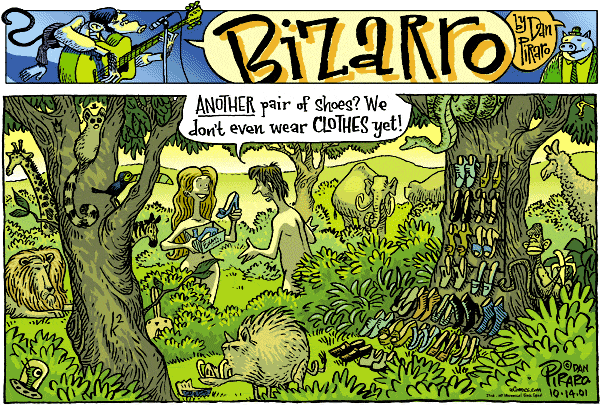I have just now seen that Alan Lenzi has called me out for avoiding “the M word” (HT to Simon Holloway) To quote him in full, since it is a short note:
If you can’t use the m-word for Genesis 1-2, then you’ve unduly privileged the Bible. It’s simply not intellectually honest to restrict the term to non-Israelite texts. If the Enuma Elish, Hesiod’s Theogony, or the Song of Ullikummi are myths (and they are by all accounts), so are the creation accounts in Genesis. To say otherwise is an explicit attempt at mystification, an ideological smoke-screen that other scholars ought to call you on.
Do go and read Alan’s post and especially the comments that follow. They are all very thoughtful and insightful. I will take a moment, however, to briefly defend my position to be placed alongside the other responses.
First, I think it hardly fair (or polite) to suggest that I am “not intellectually honest” when I choose not to use the term “myth” with reference to Genesis 1 and 2. I say this precisely because I am being open and upfront about my language choice. Furthermore, I do privilege the Bible, no doubt unduly to Alan and others, but again, I am open and honest about that. To criticize me for doing so would be the same as to criticize an atheist scholar by asserting that they must first accept that God exists before they can do research on the Bible. Again, my assumptions are clearly stated, the foundation of intellectual honesty.
Returning to the question of myth, as I said in the comments to my earlier post that began this thread, my issue with using the term “myth” is that fundamentally, as well as in popular perception, myth has the meaning of “a commonly held yet false belief.” So to say, as we often do in religious studies circles as a kind of special pleading so as not to offend, “it is a myth, but it contains deep and eternal truths” may make sense in our little circle, but to the average person it just sounds nonsensical.
In the comments on Alan’s post John Hobbins suggests Bruce Lincoln’s definition (and full disclosure: I do not know this work) of myth as “ideology in narrative form.” Alan expands and rejects that definition.
What I am really open to is a VERY general approach to myth. Perhaps it’s too general because almost anything can qualify. Myth, in this overly general view, is “ideology in narrative form” received by its target audience as authoritative (a la Bruce Lincoln). This has draw backs. We’re no longer talking about a genre, rather a mode of discourse and the reception of that discourse by an audience.
What is being missed in this discussion is the question of today’s audience. For example, my little series on Genesis is explicitly intended to be broad, general, and accessible to a non-specialist audience. So while we might, in our own academic fiefdom, be very comfortable with a nuanced definition of myth, most people understand the term to simply mean “old story that is now believed to be untrue.” If I refer to Gen. 1-2 as myth the average reader may well come to conclusions about both the text and my reading and approach to the text that I feel is unfounded. My goal then is to avoid such prejudice.
Of course many believe that Genesis 1 and 2 is just that, an old story that is untrue, but I am making the explicit assumption (the point of my initial post) that this story does contain truths. (Thus I am not being intellectually dishonest, I am being very direct and upfront about my beliefs, something that I don’t think many agnostic or atheist biblical scholars are.) What I am trying to carefully tease out in asking us to read Genesis “literarily” is what those truths are, both those intended to be conveyed and those theologically implicit within the text. Leaving to one side the “historical” claims since I contend that, reading the text literarily, we realize that it is not an historiography in any modern sense. I am also fully aware that this is precisely what many scholars and theologians are trying to do by employing the term “myth” but see my previous paragraph.
Bottom line: “Myth” is used by many because supernatural beings are involved and, the implicit assumption is, they do not actually exist. But for Jews and Christians God and such beings do exist, so why not simply jettison the term and instead focus on other traits and characteristics of the literature?






8 thoughts on “A Grave Mythstake”
Chris, A couple of points:
First, it is commendable to write for a broader audience. We need people to make scholarly views accessible. But why not use that venue as a teaching opportunity, expanding the audience’s understanding of the way we approach religious texts as scholars. “Myth” is a widely-used term among anthropologists, folklorists, and RS scholars. Gen 1-2, whatever else it may be, is quite similar, broadly speaking, to a number of other cultures’ myths. So why perpetuate a false dichotomy between the Bible and everything else by refusing to employ the term? Why allow your audience’s ignorance in this matter to dictate your approach to the genre of the literature you are teaching? The same people who recoil at the word myth are the same people who could use a little more sophistication in their hermeneutics. So why not be the challenging educator they so desperately need?
Second, it may be impolite to suggest that some believing scholars’ refusal to use the M-word is intellectually dishonest. But it is important for scholars to call one another on problems in their thinking, like when someone’s theological framework insulates them from dealing with historical evidence in an even-handed manner or when their religious beliefs or concern for a religious community keeps them from treating literary texts as they would any other text. This harks back to the old problem from the early days of religious studies in which people thought THEY (savages) have magic while WE (Europeans) have religion. That was a case where a theological framework unduly influenced an entire field of human investigation. It was wrong and needed to change; thankfully it did. Likewise the issue of myth and certain kinds of biblical scholarship. Now, perhaps you don’t deserve the label of “dishonesty” because you are forthright about your bias. When I wrote what I did, I was thinking about John Walton’s lip service to the word myth in his book on ANE Thought and then his inability in the rest of the book to use it with regard to anything Israelite. But one could argue that even if one acknowledges one’s “bias” about myth or Genesis or whatever up front, the charge of intellectual dishonesty might still apply because one’s up-front admission may simply be the product of stubbornness or denial or something else, based in emotion or whatever, to deal with the evidence in as even-handed a manner as possible. In other words, perhaps one is blinded by an ideology and cannot deal honestly though one tries or thinks one is trying. I’m not saying this is you. I’m saying it is possible that some might be unduly influenced by non-rational things to privilege the Bible. And that’s a problem if we’re talking about scholarship here. Consider the flat-earth society. If they say up front, “we believe the earth to be a flat disk because that’s what the Bible teaches and nothing can shake us from this,” is this admission the foundation of intellectual honesty? Is there not a more basic problem that needs addressed? This is where I’m coming from. I’m not saying we should all try to be neutral. I’m saying that we should all, no matter what our ultimate allegiance, try to deal with the evidence in an even-handed manner. Just because I’m an agnostic doesn’t mean I can trash the Bible. I should try to deal with the textual evidence from the ancient world fairly, including what I see in the Bible. I expect the same kind of thing from believing scholars, whoever they are writing for.
Third, I do accept Lincoln’s ideas about myth. My expansion was not contra his position, briefly laid out by Hobbins. It was simply spelling it out along with issues that it raises. See Lincoln’s book Discourse and the Construction of Society.
Fourth, I don’t know what you’re talking about when you say this: “To criticize me for doing so [unduly privileging the Bible] would be the same as to criticize an atheist scholar by asserting that they must first accept that God exists before they can do research on the Bible.” I don’t understand the homology at all.
Finally, I didn’t use your name in my post. I wasn’t calling you out personally. I linked to one of your comments as an example of what I saw going around the blogosphere. That’s all.
Alan – thank you for your thoughtful and thorough reply! I am off to a meeting all day today and tomorrow, but I want to ask one question before I would reply.
Do you consider “myth” as in some fundamental sense untrue?
I really do appreciate this discussion. Years back I was chastised by leadership for using the word ‘myth’ in an article for publication in a church magazine. Ironically my personal goal in the column before, and after that article, was largely to educate the readership. So I feel Alan’s question in the reply is appropriate. I ended up taking out the word, if the leadership couldn’t “get” my point – neither would the readers. I for one don’t think myth (whether we are talking about Genesis 1-2, or Enuma Elish) is in any sense “untrue”. But then we’ve got the lovely question of “What is truth?”
Myth is paradigmatically true for those who have accepted it. It is both the model of some aspect of their communal flourishing and a model for its future perpetuation. And therein lies the dynamic.
I should add: for those who do not accept a myth as true (for whom it is not paradigmatically true)—and that would include almost all academics in relation to a multitude of narratives from all over the world, the use of the term is short-hand for a certain inter- or trans-cultural categorization of human activity. The term has lots of problems when utilized in this way, and that’s why there is so much effort expended on defining it. But that’s true with all kinds of terms scholars attempt to use inter- or trans-culturally (e.g., religion, magic, marriage, literature, art, etc.). Although “myth” is not true for these scholars, it does help them mark and organize the culturally-accepted, paradigmatic truths of the group being studied.
Consider your use of “theology” with regard to rabbinic texts. It would be suspicious if you called rabbinic ideas about the deity “superstition” and reserved “theology” for only Christian texts. Rabbinic notions of the divine are theology for you, even if you don’t believe it all, because that is the label you use to mark out certain notions. And by doing so, you implicitly align your findings with and thereby participate in a broad, inter-cultural conversation about human thoughts through history of super-human entities. Likewise when I talk about the theology of enuma elish or whatever. If we reserved “theology” for only Christian theology (i.e., “true theology”), then we have failed as scholars to deal even-handedly with the data.
Hi Chris
May PSU and UA both be victorious Saturday. We await 2010.
I appreciate your position on “myth.” I am not a scholar as you, so I may be ridiculed by your peers, but, on principle, I adamantly avoid using BCE and CE when the opportunity presents itself to do so. I always use BC and AD, knowing full well it is not cool or “enlightened.” Perhaps BCE and CE are crusts thrown to those who do not believe in Jesus, but it just seems to me that, if I use those abbreviations I am giving tacit approval of what I perceive as a not so slightly veiled denial of the divinity of Christ and perhaps even His historicity.
Roll Tide!
John